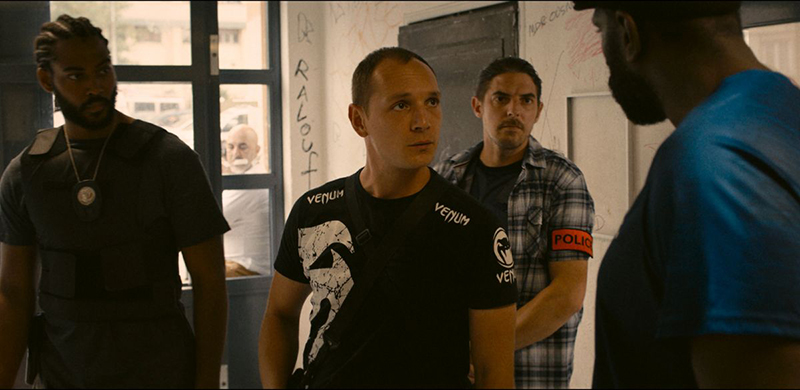
Film Review: Les Misérables
Film Reviews
Les Misérables
Director: Ladj Ly
SRAB Films
In Theaters: 01.20
I grew up in the theatre community in the ’90s, which means I’m very well acquainted with Victor Hugo’s classic story of Jean Valjean and Inspector Javert—or at least the parts of it that were set to catchy tunes. Les Misérables translates literally as The Miserable, of course, but if you think about it, Hugo’s novel could have just as aptly been titled The Marginalized.
This new film, which is up for an Academy Award for Best Foreign Language Film (and might even have stood a chance at winning in a year without Parasite), is not another retelling of Hugo’s story. However, it does take place in the suburban Parisian district of Montfermeil, where Hugo wrote the book and much of the novel’s action took place. This new film follows Stéphane (Damien Bonnard), a police officer from Cherbourg on his first day in Paris. He is assigned to ride along with Chris (Alexis Manenti) and Gwada (Djibril Zonga)—two seasoned officers who dub him “Greaser” due to his overly styled hair—and patrol the more dangerous areas of the city with confidence and no small amount of swagger. Things go very wrong while the three are pursuing a young teenaged suspect, and an incident is captured on video by a kid who is playing with his new drone. Greaser’s first day becomes a long and harrowing one, as he witnesses first-hand the racially charged tensions between the poor and those in power. He not only sees the cruelty of life in the streets, but finds himself trying to be the voice of reason in a sea of injustice and corruption.
Director and co-writer Ladj Ly (who grew up in Montfermeil) is passionate about his subject and makes good use of his background in documentaries to give the film a touch of the cinéma vérité style. With Les Misérables, he establishes himself as an exciting talent. The film has echoes of a film such as Training Day, but makes strong and pointed parallels between Hugo’s work and today’s problems of poverty, gangs, violence and police brutality. It’s an engrossing and unflinching look at the lives of the unfortunate and oppressed in society, and a searing commentary on how easily “peacekeeping” can devolve into a match thrown into a powder keg.
The cast is excellent all around, with Bonnard giving a great, low-key performance as Greaser, and young Issa Perica is haunting as a boy caught up in the middle of the various struggles. However, it’s Almamy Kanouté as Salah, a restaurant owner and respected figure in the local Muslim community, whose intensity and dignity make perhaps the strongest impression.
This Les Misérables is a terrific film that deserves to be seen and discussed. Like its namesake, it might even help change the way people think about how they treat each other. However, this version doesn’t give you the chance to buy a $30 souvenir T-shirt in the lobby to clutch tightly along with your other valuables as you leave the theater, refusing to even make eye contact with the homeless person whose request for spare change annoyingly interrupts you as you hum songs about love and compassion for even the lowest of God’s children. That’s why we have Broadway. –Patrick Gibbs